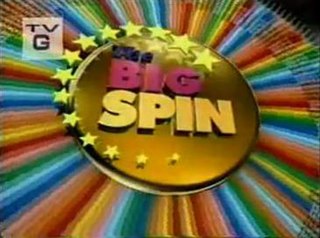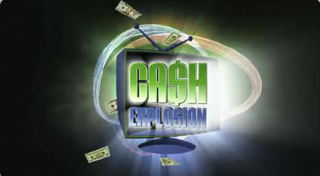
Name That Tune is an American television music game show. Originally created and produced by orchestra conductor Harry Salter and his wife Roberta Semple Salter, the series features contestants competing to correctly identify songs being played by an on-stage orchestra or band.

Winning Streak is an Irish television game show that was produced for the National Lottery, and broadcast from 21 September 1990 to 21 March 2020 on RTÉ One. Produced in RTE's Studio 1 at their Television Centre in Dublin, the series featured contestants qualified via National Lottery scratchcards, who received the chance to win cash and other prizes. The climax of each episode featured one of the contestants receiving a chance to spin a wheel for a chance to win the programme's grand prize, which had escalated to one million Euro by the end of the series.
Fame & Fortune is a game show broadcast on RTÉ One on Saturday nights between 1996 and 2006. Presented by Marty Whelan, the show aired during the summer months of June, July, and August as a seasonal replacement for Winning Streak. It was preceded by Millionaire, also hosted by Whelan, and succeeded by The Trump Card in 2007, hosted by Laura Woods.

The Pennsylvania Lottery is a lottery operated by the Commonwealth of Pennsylvania. It was created by the Pennsylvania General Assembly on August 26, 1971; two months later, Henry Kaplan was appointed as its first executive director. The Pennsylvania Lottery sold its first tickets on March 7, 1972, and drew its first numbers on March 15, 1972.
Cash Bonanza is an Australian game show hosted by Larry Emdur, which was broadcast on the Nine Network in 2001. Filmed at Warner Bros. Movie World on the Gold Coast, Queensland, Australia, Cash Bonanza was a joint initiative between all five Australian lottery agencies.
Illinois Instant Riches is a lottery game show airing in the state of Illinois, as well as nationally on Chicago-based Superstation WGN-TV. The show was hosted by Mark Goodman, with Linda Kollmeyer as his co-host and Bill Barber as announcer.
Wheel of Fortune is an Australian television game show produced by Grundy Television until 2006, CBS Studios International in 2008, and Whisper North, in association with Sony Pictures Television and Paramount Global Content Distribution, in 2024. The program aired on the Seven Network from 1981 to 2004 and January to July 2006, aired at 5:00 pm from 1981 to 1989 and from 2004 to 2006 and at 5:30 pm from 1989 to 2003, and is mostly based on the same general format as the original American version of the program.

Miljoenenjacht, officially Postcode Loterij Miljoenenjacht, is a Dutch game show, sponsored by the country's postcode lottery, where a contestant and at-home viewer could win up to €5,000,000 or as little as €0.01. The show is broadcast at various times, spanning across six episodes for each set. The program was originally shown by TROS on NPO 2, but moved to creator John de Mol's channel Tien in 2005. After the channel was discontinued after its sale to the RTL Group, the program moved to RTL 4. In 2019, the program moved to SBS6 due to the transfer of Linda de Mol from RTL to SBS.
Sale of the Century is an Australian prime time game show that aired on the Nine Network from 14 July 1980 to 29 November 2001. It is based on both Great Temptation that aired from 1970 to 1974 and on the original Sale that first aired in the United States from 1969 to 1973. The Australian format of Sale has since been used internationally, including in a revived US version that aired from 1983 to 1989.

The New Zealand Lotteries Commission, trading as Lotto New Zealand since 2013, is a Crown entity that operates nationwide lotteries in New Zealand. It was established in 1987 and operates under the Gambling Act 2003. Its oldest and most popular game is Lotto, which boasts a top prize pool of NZ$1 million. Other games include the four-draws-daily Keno, the daily Bullseye, and a variety of scratchcards and online games known as Instant Kiwi. Instant Kiwi may only be played by persons 18 years of age or older, under the Gambling Act 2003. Powerball and Lotto Strike are optional extras with every Lotto ticket. Powerball is a jackpotting game, with a maximum jackpot of $50 million - after which a Must Be Won draw must be called.

Wheel of Fortune is a British television game show based on the American show of the same name created by Merv Griffin. Contestants compete to solve word puzzles, similar to those used in Hangman, to win cash and prizes. The title refers to the show's giant carnival wheel that contestants spin throughout the course of the game to determine their cash and/or prizes.

The Big Spin is the California Lottery's first television game show.
The Wisconsin Lottery is run by the Wisconsin Department of Revenue and was authorized in 1988 by the state legislature. It is a member of the Multi-State Lottery Association (MUSL). Its games consist of Mega Millions, Powerball, Megabucks, Supercash!, Badger 5, Pick 3, Pick 4, All or Nothing, and scratch games. Since its founding, it has generated $4.6 billion for property tax relief for state residents.

Cash Explosion, known as Cash Explosion: Double Play from 1989 until 2012, is the official Ohio Lottery TV game show, which is broadcast on television stations throughout Ohio. The show originated in Cleveland and is now taped by Mills James Productions in Columbus, Ohio.

Hoosier Millionaire is an American television lottery game show which aired on television stations in Indiana, Illinois and Kentucky from October 28, 1989, to November 19, 2005. At its peak, it was among the highest-rated lottery game shows in the United States and one of the highest-rated television programs in Indiana.

Wheel of Fortune is a Philippine television game show broadcast by ABC and ABS-CBN. The show is based of American original of the same name. Originally hosted by Rustom Padilla, it aired on ABC from November 19, 2001 to May 31, 2002. The show moved to ABS-CBN's Primetime Bida line up from January 14 to July 25, 2008, replacing the second season of Kapamilya, Deal or No Deal and was replaced by the third season of Kapamilya, Deal or No Deal. Kris Aquino serve as the final host.

Make Me a Millionaire is the second television game show of the California Lottery, having replaced The Big Spin on January 17, 2009. Originally contracted for a four-year run, the show was cancelled after eighteen months, with its final episode telecast on August 7, 2010. On July 9, five unaired episodes were uploaded to the California Lottery's official YouTube page.
La Poule aux œufs d'or is the title of two different Canadian television game shows broadcast during two different periods.

Wheel of Fortune is an American television game show created by Merv Griffin. The show has aired continuously since January 6, 1975. Contestants solve word puzzles, similar to those in hangman, to win cash and prizes determined by spinning a giant carnival wheel. The current version of the series, which airs in nightly syndication, premiered on September 19, 1983.
The National Lottery Big Ticket was a BBC National Lottery game show broadcast on BBC One from 28 March to 11 July 1998. It was hosted by Patrick Kielty and Anthea Turner.











